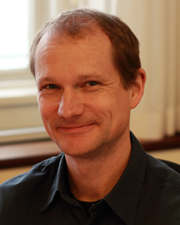Space Science Center receives 4.7 million kroner from the Research Council
The Space Science Center at the University of Copenhagen has received a grant of 4.7 million kroner from the Research Council. The Center is comprised of 10 research groups at several institutes and they all have one thing in common, that they use the same platform for their research – space.

Kristian Pedersen, Director of the
Space Science Center
"The grant will be used to jumpstart Danish participation in two new satellite missions”, explains Kristian Pedersen, Director of the Space Science Center.
The first project, Euclid, is an ESA-mission, which will be used to study dark matter and dark energy, which they know exist in space, but which remain a mystery for researchers. The satellite will be launched in 2018. It will be placed in space on the other side of the moon where it is always ’delightfully dark’ and as a result has good conditions for observations.
The second project, JANUS, is a NASA-mission, which will be launched into space and will lie in an orbit around the Earth, so you can always easily come into contact with it. It will discover and study the most distant gamma ray bursts, which appear in the sky at random, so the satellite will be able to quickly send a message to Earth where telescopes can study the gamma ray bursts in detail. The satellite is scheduled to be launched in 2016.
"It is important to be involved in satellite missions from the start, so that we get unhindered access to the groundbreaking data from the satellites when they are launched and put into operation. Furthermore, we get to influence how the instruments on the satellites are designed so that we get the best conditions for our research”, explains Kristian Pedersen.
The grant of 4.7 million kroner over 3 years will partly be used to hire two researchers in PhD and post doc positions and partly to make preliminary studies for the satellite missions in collaboration with Danish companies.
